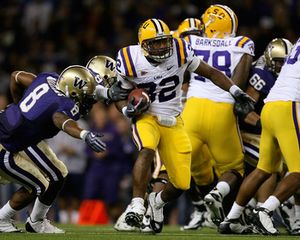Greenfield: Amazon Poised to Be Most Disruptive Tech Giant
The smarter way to stay on top of the multichannel video marketplace. Sign up below.
You are now subscribed
Your newsletter sign-up was successful
BTIG media analyst Richard Greenfield – one of the early backers of the over-the-top model – predicted that online retailer Amazon is best poised to become the most disruptive force in the pay television industry, outpacing Netflix and using its vast resources to fund forays into sports and other entertainment.
“They [Amazon] are all about the bundle, it is just a different bundle than what we are accustomed to,” Greenfield said on The CUSP Show, the official podcast of the Columbia University Sports Management Program. “It’s music, it’s video, it’s shipping. They want to be a bundled player.”
Amazon has already committed to spending billions on original programming and earlier this week revealed that its Amazon Prime service, which includes free two-day shipping for products, video and music, just passed 100 million customers.

Amazon is no stranger to sports – it renewed a deal for streaming video rights for Thursday Night Football in April – and has been thought to have greater aspirations. But the company has been reluctant to spend heavily on products that it can’t the directly to additional subscriptions. While sports hasn’t passed that smell test so far, it may in the near future.
Greenfield said data gleaned from the company’s digital relationship with viewers will be the difference.
“They are going to use that data to inform their decision making,” Greenfield said. “Amazon ran a test, they clearly understand now, even [with] just a simulcast, how many people watched, how long did they watch, why did they tune out, what did we learn, do those people buy more NFL merchandise over the course of the next year, did those people buy more NFL tickets over the next year. It’s using the data to make a much wider ranged decision than the way a traditional media company can make a decision.”
Greenfield doesn’t believe Amazon or any other tech giant wants to spend the money to wrest Sunday football from the broadcast networks. But he believes that Monday Night Football could be an attractive target.
The smarter way to stay on top of the multichannel video marketplace. Sign up below.
“I think the NFL will keep Sunday on broadcast TV for the foreseeable future,” Greenfield said. “I think reach, and the success of Sunday night football, Thursday Night Football and Sunday afternoon football is going to keep that on broadcast well into the next decade. If you wanted to change the TV ecosystem in a meaningful way, Monday Night Football already moved from broadcast to cable once, moving from cable to the Internet doesn’t seem crazy.”
Greenfield noted there are risks – he estimated the NFL gets $2 billion a year for MNF rights from ESPN.
“The dollars are significant. On the flip side, this sort of feels like, if you’re a tech player, this is your one big shot to see how you can change the game. …If you pull that sports piece out of the Jenga puzzle the game collapses.”
And the analyst added that other tech companies could also enter the fray – Facebook bid on Indian Premier League cricket rights last year (it lost), streams Major League Soccer games and in March reached a deal to stream 25 Major League Baseball games this season, Apple is investing heavily in entertainment content and even Netflix, which so far has stayed away from sports, could find a way in.
“The players that will matter [in sports rights] are going to be bigger companies that have the balance sheets and capacity to do it today and could attack this opportunity over the course of the next five years in a very methodical way,” Greenfield said.
